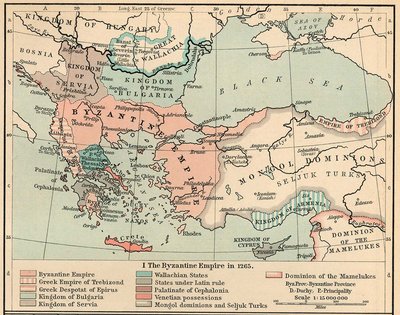Morea
|
|
The name Morea (Μωρέας) for Peloponnesos first appears in the 10th century in Byzantine chronicles. The anonymous 14th century Chronicle of Morea, in more than 9000 lines of political verse, relates events of the establishment of feudalism in mainland Greece by the Franks, following the Fourth Crusade. The Chronicle is famous in spite of its historical unreliability because of its lively description of life in the feudal community and because of the character of the language which reflects the rapid transition from Medieval to Modern Greek. The Chronicle, written in French, survives in two parallel Greek texts, the Ms Havniensis 57 (14th-15th century, in Copenhagen) and the Ms Parisinus graecus 2898 (15th-16th century, at the Bibliothèque National, Paris), and the difference of about one century shows a considerable number of linguistic differences due to the rapid evolution of the Greek language.
After the conquest of Constantinople by the forces of the Fourth Crusade (1204), two groups of Franks undertook the occupation of the Morea and created a loose alliance of the Greek population under a Latin (Western) autocrat, as the Principality of Achaea, centered within the Peleponnesos, which the Latins, following local practice, called the Morea. The most important prince in the Morea was Guillaume II de Villehardouin (1245-1287), who fortified Mistra (Mystras) near the site of Sparta in 1249 but, after losing the battle of Pelagonia (1259) to the Byzantine Emperor Michael VIII Palaeologus, was forced to ransom himself by giving up most of the eastern part of Morea and his newly built strongholds. In the following century, Morea was then organized into a despotate under the late Byzantine Empire, centred on Mistra. The despots of Morea were usually the current heirs of the Byzantine emperor. After Guillaume's death, the remainder of the Frankish part of Morea came into possession of the Angevins and lost its importance.
See Mistra for more information and a list of rulers.
About the name "Morea"
There is some uncertainty over the origin of the name "Morea". As with many other things in the Balkans, part of the uncertainty stems from the political implications behind each suggested origin of the name.
Popular belief in Greece today is that the name originates from the word moria, meaning mulberry, a common plant in the region. The use of a long 'o' (Μωρέα) is a strong argument against this explanation.
PeloponnesosMap.jpg
The 1830, German historian Jakob Philipp Fallmerayer (1790-1861) published the first of his volumes Geschichte der halbinsel Morea wahrend des Mittelalters ("History of the Morea Peninsula during the Middle Ages"). Based on his analysis of the spread of Slavic placenames in mainland Greece, Fallmerayer concluded that the 19th century Greeks had almost no lineal cultural connection to the ancients and a large one to the Slavic tribes who invaded during the 6th and 7th centuries (See also History of Roman and Byzantine Greece). To support his thesis, Fallmerayer proposed that the word comes from the Slavic word More, meaning sea.
Reference
- Crusaders as Conquerors: the Chronicle of Morea, translated from the Greek with notes and introd. by Harold E. Lurier, Columbia University, 1964.
External links
- Mystras (http://hellas.teipir.gr/prefectures/english/Lakonias/Mistras.htm): illustrated capsule history
- Mystra: history (http://www.laconia.org/Mystra1_history.htm)de:Morea

